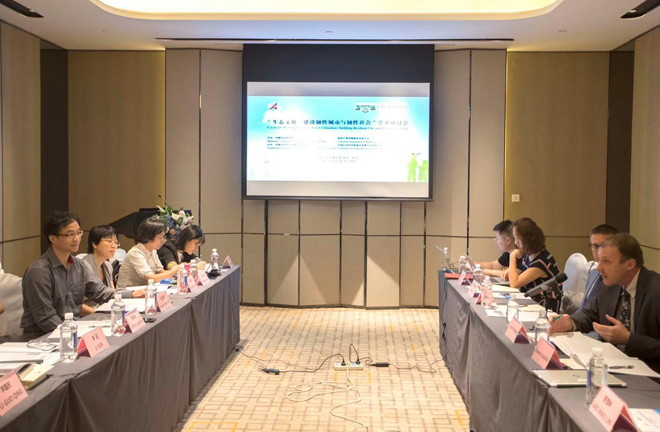Building more resilient cities

Scholars at a symposium on building resilient societies and cities Photo: CASS
BEIJING—At a symposium held at the end of August on building resilient societies and cities, scholars from China and New Zealand discussed related concepts, policies and practices.
Pan Jiahua, director of the Institute for Urban and Environmental Studies at the Chinese Academy of Social Sciences (CASS), said that with the rapid urbanization over the past several decades, city construction is facing a double challenge of shifting its focus from the countryside and from growth rate to development quality. The natural risks and unsustainability under the framework of industrial civilization have loomed large. Therefore, the construction of resilient cities in China should be based on nature and should utilize nature on the premise of respecting and conforming to it. Comprehensive innovation covering whole industrial chains should be done, particularly in the fields of energy production and consumption. This is the key path for transforming from an industrial civilization to an ecological civilization.
Bruce Clarkson, vice-chancellor of the University of Waikato, introduced the practice of restoring the natural landscapes inside cities, including strengthening the management of weeds and pests, establishing natural reserve buffer zones, expanding and connecting fragmented green space, and setting up habitats for different species. He put forward that scientific and technological methods will be broadly applied in the future in terms of the reconstruction of ecosystems.
Li Xun, deputy director of the China Academy of Urban Planning & Design, said that the resilience of cities can be evaluated quantitatively by means of scientific theories and methods. Major evaluation indicators include the capabilities of resisting external shocks, adapting to changes and self-healing. In the future, the concept of building ecological cities should be applied over the course of city construction. The evaluation of ecological cities should be done from the perspectives of harmony and diversity, circulation, regeneration and zero waste, and sustainable development.
James Beattie, president of the New Zealand Asian Studies Society, introduced the transformation of ecological systems for the Maori, the effect of European invasion and colonization on the local environment, and current environmental protection from the perspective of the transformation of ecological systems in New Zealand. He added that, at present, New Zealand is facing such environmental issues as conflict between development and protection, balance between agricultural development and resources, the challenges of climate change, the expansion of cities, industrial development, and the shortage of natural resources.
Zheng Yan, a research fellow of the Institute for Urban and Environmental Studies at CASS, said that climate change is a new challenge for poverty alleviation. Poverty in China has presented apparent geographical features. Currently, some impoverished residents and regions are distributed in western areas with ecological sensitivity and high climate vulnerability. China needs to take into consideration the combining of the objectives of poverty alleviation and green development in such experimental policies as targeted poverty alleviation and the establishment of a national ecological civilization pilot zone.
edited by SU XUAN
